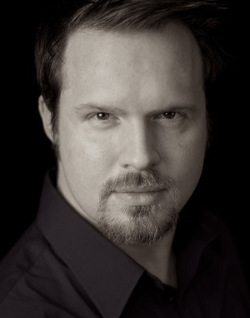Director's notes: Cinderella (La Cenerentola)
Rossini | 2017 Festival
Director A. Scott Parry on the real magic of Rossini's Cinderella story (spoiler: It doesn't involve glass slippers) and why it's still enchanting audiences 200 years later

Cinderella director A. Scott Parry
Many La Cenerentola productions have at their core the idea of an “enchanted fairy tale” which is basically how we have come to see the Cinderella story. Disney has especially made our perception of this tale fit snugly into a “magical” way of thinking. But Rossini’s intentions for La Cenerentola were for a decidedly non-magical opera. “No wizards or talking cats,” is how he put it. The strength here lies in truly human characters comically showing their shortcomings and sincerities, all within a familiar children’s story.
Don Magnifico, a widower, is an angry, somewhat sloppy drunkard, owing to the death of his wife, his dwindling fortunes, and his unfortunate position of being caretaker to some very obnoxious girls. He needs a way to just get through the day. His two cruel and annoying daughters act out against Cinderella only in accordance with what they’ve been given as an example from their father, and they are none too bright or self-aware to understand the heartlessness of their behavior.
Angelina is in some sense the embodiment of the meek and broken in all of society, those who endure harsh conditions and become emotionally disabled. Those who, when finally given opportunity and support (in this instance from the enlightened philosopher Alidoro), ultimately find the strength within themselves to succeed. But without this “helping hand,” Angelina would simply stay by the fire and never realize herself for who and what she is. This, of course, points out the interdependence between the individual and the larger society, showing us the benefit of looking beyond the surface value of others and offering communal help to those in need while never knowing what the full result of that action might be.
Prince Ramiro shows us the flipside of this argument, generally acting out of frustration and wielding power as punishment -- the governor of an established order. Yet he comes to learn that true power lies in forgiveness, by being himself a firsthand witness to Angelina’s transformation. The Prince is our own societal substitute, and we see the story through his eyes. And that leaves us lastly with Dandini, whom I see as a Puck-ish figure. He is the ultimate ignorant imp who when given absolute power to wield, thoroughly enjoys tossing it about willy-nilly with reckless abandon and hilarious results.
With an approach anchored to core humanistic truths, we end up with a production that not merely entertains, but also instructs. Of all Rossini’s comedies, this one most allows for a believably human experience to be appreciated. La Cenerentola’s subtitle is “La bontà in trionfo” (The Triumph of Goodness). I think that’s a persistently important and timely thing to witness.
MORE ABOUT CINDERELLA (LA CENERENTOLA)
Don Magnifico, a widower, is an angry, somewhat sloppy drunkard, owing to the death of his wife, his dwindling fortunes, and his unfortunate position of being caretaker to some very obnoxious girls. He needs a way to just get through the day. His two cruel and annoying daughters act out against Cinderella only in accordance with what they’ve been given as an example from their father, and they are none too bright or self-aware to understand the heartlessness of their behavior.
Angelina is in some sense the embodiment of the meek and broken in all of society, those who endure harsh conditions and become emotionally disabled. Those who, when finally given opportunity and support (in this instance from the enlightened philosopher Alidoro), ultimately find the strength within themselves to succeed. But without this “helping hand,” Angelina would simply stay by the fire and never realize herself for who and what she is. This, of course, points out the interdependence between the individual and the larger society, showing us the benefit of looking beyond the surface value of others and offering communal help to those in need while never knowing what the full result of that action might be.
Prince Ramiro shows us the flipside of this argument, generally acting out of frustration and wielding power as punishment -- the governor of an established order. Yet he comes to learn that true power lies in forgiveness, by being himself a firsthand witness to Angelina’s transformation. The Prince is our own societal substitute, and we see the story through his eyes. And that leaves us lastly with Dandini, whom I see as a Puck-ish figure. He is the ultimate ignorant imp who when given absolute power to wield, thoroughly enjoys tossing it about willy-nilly with reckless abandon and hilarious results.
With an approach anchored to core humanistic truths, we end up with a production that not merely entertains, but also instructs. Of all Rossini’s comedies, this one most allows for a believably human experience to be appreciated. La Cenerentola’s subtitle is “La bontà in trionfo” (The Triumph of Goodness). I think that’s a persistently important and timely thing to witness.
MORE ABOUT CINDERELLA (LA CENERENTOLA)
Cinderella (La Cenerentola) at The Grand
Cast
tickets & venue
Prices Tickets $29 & up; On sale now!
Box Office Purchase online | 302-442-7807
Venue The Grand Opera House, 818 N. Market St. Wilmington, DE (seating chart; directions)
Box Office Purchase online | 302-442-7807
Venue The Grand Opera House, 818 N. Market St. Wilmington, DE (seating chart; directions)
This organization is supported, in part, by a grant from the Delaware Division of the Arts, a state agency, in partnership with the National Endowment for the Arts. The Division promotes Delaware arts events on www.DelawareScene.com.
OperaDelaware
4 S. Poplar St.
Wilmington, DE 19801
302-658-8063; info@operade.org
BOX OFFICE 302-442-7807
Wilmington, DE 19801
302-658-8063; info@operade.org
BOX OFFICE 302-442-7807



